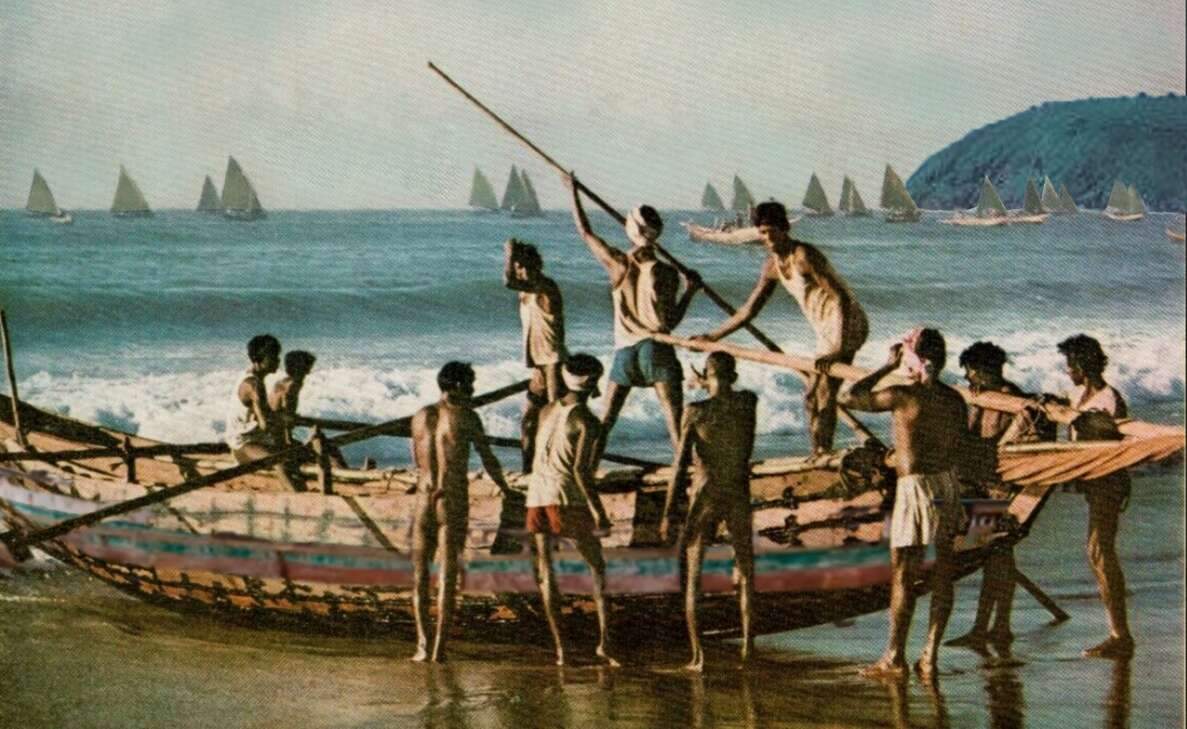

Centuries before Vizag became a destiny for coastal traders, colonists and inbound migrants, the budding fishing village that became today’s big city was a mere cluster of huts and fishing boats on the seashore in the shelter of hills at the mouth of an unfamiliar Uppeteru river leading to the backwater. The indigenous fishermen of this habitation were Jalaris, the oldest and continuous surviving sea fishing community of Vizag. The community’s name ‘Jalari’ has origins in Sanskrit- Jala meaning ‘sea’ and ‘net’. They were originally freshwater fishers, who gravitated to the seashore to become the coastal town’s first community of fisherfolk, who, for centuries, brought ashore the daily catch. They also were the source of inspiration 100 years ago for India’s freedom fighters, when the renowned poet Sarojini Naidu composed an elegant tribute to those forgotten fisherfolk, reproduced here on the occasion of India’s Independence Day.
Sarojini Naidu was a poet that belonged to an era of struggle, national pride, and freedom fighting. Though the poem Coromandel Fishers is about the fishermen of Vizag, it metaphorically reflects the poet’s desire for a free India, thus encouraging the people of the nation to hasten their struggle.
Rise, brothers, rise; the wakening skies pray to the morning light,
The wind lies asleep in the arms of the dawn like a child that has cried all night.
Come, let us gather our nets from the shore and set our catamarans free,
To capture the leaping wealth of the tide, for we are the kings of the sea!
No longer delay, let us hasten away in the track of the seagull’s call,
The sea is our mother, the cloud is our brother, the waves are our comrades all.
What though we toss at the fall of the sun where the hand of the sea god drives?
He who holds the storm by the hair will hide in his breast our lives.
Sweet is the shade of the cocoanut glade, and the scent of the mango grove,
And sweet are the sands at the full o’ the moon with the sound of the voices we love;
But sweeter, O brothers, the kiss of the spray and the dance of the wild foam’s glee;
Row, brothers, row to the edge of the verge, where the low sky mates with the sea.
India celebrates National Women’s Day on 13 February each year, marking the birth anniversary of Sarojini Naidu (13 February 1879-2 March 1949). She was a part of the Indian freedom movement and the first woman president of the Indian National Congress. Following India’s Independence, Sarojini Naidu was appointed Governor of Uttar Pradesh.
Pre Independence, the Jalari fishermen went to sea for the daily catch and were the mainstay of commerce in Vizag. The women salted and dried the fish. They refused to use the expensive processed salt and used earth salt obtained by the evaporation of seawater. The community was poor and their income was about Re 1 per day. The men braved the treacherous surf to rescue many a sailor stranded in ferocious Bay of Bengal storms. Before the harbour was built, they provided the Masula Boat ferry service for offshore shipping. They provided the coolie labour that built the town and also gave rise to the seafaring traditions that are now proudly acclaimed in a modern port and well-equipped Indian Navy. Mechanisation, ocean-going trawlers, and plastic netting may have overwhelmed their simple lifestyle, yet, these hardy fisherfolk remain part of local folklore.
Industrialization and disease almost wiped out this community in Vizag but they managed to survive and thrive. The tale of the Jalaris’ dark and tragic evolution is an often-forgotten cornerstone of Vizag’s history. In the 1890s, the railway was constructed to the Vizag shore and the Municipality moved the village to the area near where the Town Hall was later built. In 1896-99, the village was transferred to an area near the backwaters but had to move the village again in 1899 back to the seafront near the Sand Hill seashore (later the Coastal Battery area) because the fishermen were dying at an unusually high rate believed to be caused by malaria. The existence of the community was at the mercy of mosquitoes, toddy, and unscrupulous moneylenders whose interest rates were close to 25%. Some Jalari folk found work with the coolie demand for the building of the beach road, railways
and later the harbour. They loaded railway wagons and ferried cargo to waiting ships. Some found coolie work across the Bay of Bengal in Burma.The old Jalaripetta fishing village was moved to the Scandal Point area and from there to the Pedda Jalaripetta in its current location near Lawson’s Bay. Chepalu! Chepalu! was a familiar refrain through the town as it announced that a fisherwoman was selling fresh fish door-to-door. Fresh seafood was in abundance and the Jalari were the source of the day’s catch that could also be bought on the beach. Their industry also extended to the dried and salted fish industry for Vizag’s growing population. Commercial trawlers were introduced to maximize the catch from the lucrative fish stock in the Bay of Bengal’s Continental Shelf, but mechanized trawlers, motor-propelled small-craft and nylon netting have not dented the domination of this fishermen community in Vizag.
Over the years, these hardy, easy going and simple folk have withstood disasters from their thatched-roof villages being ravaged by fires to being washed away by cyclones and angry seas. They have continued to labour in their traditional role and, despite the trials of industrial growth, have also grown by harnessing the boundless harvest of the seas.
Written by John Castellas whose family belonged to Vizag for five generations. Educated at St Aloysius, migrated to Melbourne, Australia in 1966, former General Manager of Engineering at Boeing & Qantas Airways, in retirement Lecturers in Aviation Management at Swinburne University and is a Vizag aficionado. He can be contacted at jcastell@ozemail.com.au
Stay tuned to Yo! Vizag website and Instagram for more heritage stories.
If you’re someone who thrives on suspense, unpredictable twists, and heart-racing plotlines, the new OTT…
Looking to escape the crowds and explore places that offer raw beauty, cultural charm, and…
The Chennai Super Kings (CSK) vs Lucknow Super Giants (LSG) IPL match today at the…
To meet the rising demand for travel during the summer season, the Waltair Division of…
Air India has announced a special daily flight service connecting Visakhapatnam, Bengaluru, and Kathmandu, Nepal,…
In a major step toward easing traffic congestion in the city, the Andhra Pradesh government…
Leave a Comment